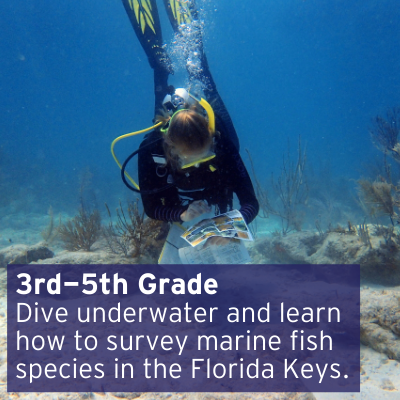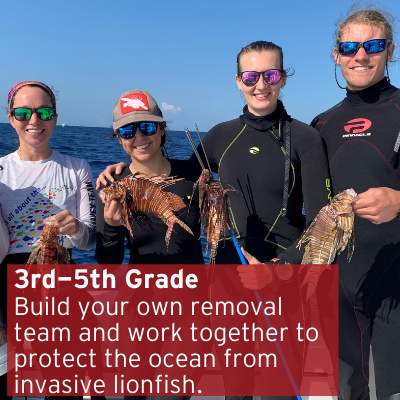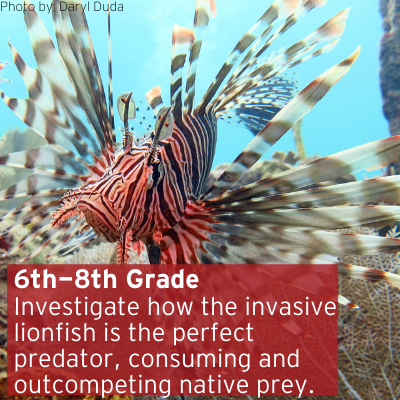Virtual Field Trips HomeImplementation Guide and FAQStart Your Virtual Field Trip
Below are descriptions for the three virtual field trip themes: The Volunteer Fish Survey Project, Grouper Moon Project, and the Invasive Species Program. If you would like more information regarding any of these topics for the virtual field trips, let us know! Email explorers@REEF.org or call our office at 305-852-0030.
Volunteer Fish Survey Project
Through the Volunteer Fish Survey Project (VFSP), REEF facilitates programs that actively engage divers, snorkelers, and other marine enthusiasts in marine conservation. This citizen science program has generated the most extensive marine life database globally, with over 250,000 surveys conducted at almost 15,000 sites throughout the world’s oceans by over 16,000 volunteer divers and snorkelers worldwide.
REEF’s volunteer divers and snorkelers become citizen scientists, as they are collecting and reporting information on marine fish populations and selected invertebrate and algae species in temperate areas. Various resource agencies and researchers use the significant data contributed by these marine citizen scientists.
Become citizen scientists with REEF and contribute to the world’s largest marine life database!
 |
 |
Grouper Moon Project
Grouper Moon is a collaborative conservation program between REEF and the Cayman Islands Department of the Environment (CIDOE) studying Nassau grouper (Epinephelus striatus) – a social and ecological cornerstone of the Caribbean’s coral reefs. Historically, Nassau grouper represented one of the Caribbean’s most economically important fisheries. Unfortunately, due to intense harvest at the gatherings where these fish reproduce, called spawning aggregations, their populations have dwindled to a fraction of their historic numbers.
Since 2002, REEF and the CIDOE have coordinated annual efforts to monitor and study Little Cayman Nassau grouper spawning aggregations. The team has developed a protocol for monitoring the fish’s numbers and activity at the site through the Grouper Moon Project. The project also studies the historical aggregation sites on Grand Cayman and Cayman Brac. It’s grown in scope to include an ambitious acoustic tagging project, juvenile habitat research, genetic studies, and a water current drifter project to understand how currents and other oceanographic conditions affect grouper larvae recruitment.
Support scientists in monitoring this vital endangered species to keep coral reefs healthy while exploring new technologies in marine science research!
 |
Invasive Species Program
Known for their show-stopping appearance, venomous spines, and the damage they cause to coral reefs, invasive lionfish are the first non-native marine fish established in the Atlantic. Lionfish pose a significant threat to local marine ecosystems due to widespread predation of native species, high-volume reproduction, and lack of natural predators.
REEF works in close partnership with government agencies and partners throughout the region to help develop lionfish response plans, train resource managers and dive operators in effective collecting and handling techniques, and conduct cutting-edge research to help address the invasion. To aid in this effort, REEF recruits interested recreational divers and snorkelers to join organized lionfish research and removal projects, encouraging public participation to address the invasion through annual lionfish workshops and fishing competitions called derbies.
Develop your research skills and take part in removing this voracious, invasive predator!
 |
 |
Download a PDF version of the Ocean Explorers Virtual Field Trips Program Information page below




